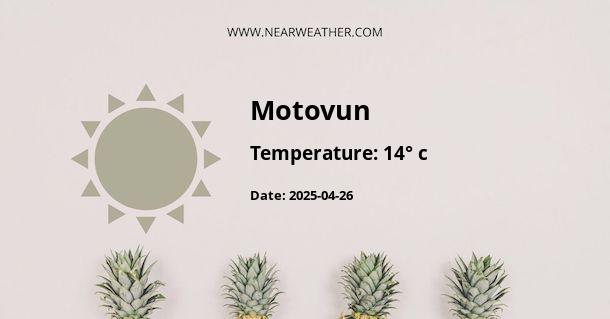Introduction to Motovun's Climate and Weather Patterns
Motovun, a picturesque hilltop town located in the heart of Istria, Croatia, boasts a rich history and stunning landscapes. But beyond its cultural and scenic allure, Motovun also features a unique climate that is influenced by both its geographical position and its elevation above sea level. Understanding the climate and weather patterns of Motovun is crucial for those planning to visit or analyze the region's agricultural potential, particularly with respect to the cultivation of truffles and wine grapes for which the area is renowned.
Geographical Context and Climate Influences
Motovun sits atop a hill overlooking the Mirna River Valley, at an elevation of approximately 270 meters. Its position on the Istrian peninsula means that the climate is shaped by both the Mediterranean and Continental influences, leading to warm and dry summers and cool, sometimes wet, winters. This dual climate influence is particularly interesting for climatology enthusiasts and viticulturists alike.
Temperature Patterns throughout the Year
Motovun experiences a temperate climate with a significant range of temperatures throughout the year. Summers are warm with average highs around 26°C (79°F) and lows around 16°C (61°F). Winters, however, can be quite cool with average highs of 8°C (46°F) and lows around 0°C (32°F).
Spring
- March: The beginning of the spring season is characterized by a gradual increase in temperature, with an average high of 12°C (53°F) and an average low of 3°C (37°F).
- April: Temperatures continue to rise in April with an average high of 16°C (60°F) and an average low of 7°C (44°F).
- May: By May, spring is in full bloom, with an average high of 21°C (69°F) and an average low of 12°C (53°F).
Summer
- June: The beginning of the summer brings warmer weather, with an average high of 25°C (77°F) and an average low of 15°C (59°F).
- July: In the midst of summer, temperatures peak with an average high of 28°C (82°F) and an average low of 17°C (63°F).
- August: August is similar to July, with an average high of 27°C (81°F) and an average low of 17°C (63°F).
Fall
- September: As fall begins, temperatures start to decrease, with an average high of 24°C (75°F) and an average low of 14°C (57°F).
- October: Continued cooling brings an average high of 18°C (64°F) and an average low of 10°C (50°F).
- November: By the end of fall, the averages drop to a high of 13°C (55°F) and a low of 6°C (42°F).
Winter
- December: Winter introduces cooler temperatures with an average high of 9°C (48°F) and an average low of 2°C (35°F).
- January: The coldest month on average has a high of 7°C (44°F) and a low of 1°C (33°F).
- February: The temperatures in February are similar to January, with an average high of 8°C (46°F) and an average low of 1°C (34°F).
Precipitation and Humidity Levels
Motovun sees a significant amount of rainfall throughout the year, with the wettest months generally occurring in late fall. The distribution of precipitation is important for the town's famed truffle industry, as the moisture impacts the growth of these valuable fungi.
The annual rainfall in Motovun averages around 1400 mm (55 inches). Humidity levels tend to be high during this period, thanks to the proximity of the Adriatic Sea and the land's orographic enhancement due to Motovun's hilltop position.
Seasonal Rainfall Distribution
| Month | Rainfall (mm) | Rainfall (inches) |
|---|---|---|
| January | 78 | 3.07 |
| February | 65 | 2.56 |
| March | 78 | 3.07 |
| April | 83 | 3.27 |
| May | 85 | 3.35 |
| June | 96 | 3.78 |
| July | 63 | 2.48 |
| August | 101 | 3.98 |
| September | 150 | 5.91 |
| October | 163 | 6.42 |
| November | 163 | 6.42 |
| December | 107 | 4.21 |
Wind Patterns and Climatic Events
The wind is another critical climatic factor in Motovun, heavily influencing the local weather conditions. Istria is often affected by the 'Bora', a strong northeast wind that can significantly lower temperatures and increase evaporation rates. Conversely, the 'Jugo' or 'Sirocco' can bring warm, humid air from the south, occasionally resulting in heavy rainfall and storms.
Due to the town's location and its elevated position, Motovun can experience localized climatic events different from the immediate surroundings. Microclimates created by the undulating terrain can lead to varied weather patterns within short distances, a factor that is particularly significant for agriculture and viticulture.
Advice for Tourists Based on Weather Patterns
For those looking to explore Motovun and enjoy its outdoor activities, the late spring through early fall would be the ideal time. This window provides a balance of warm temperatures and relatively lower precipitation. Hiking, cycling, and enjoying the town's gastronomic offerings are especially pleasant during this time. Vineyard tours and truffle hunting are popular activities, with truffle season typically peaking in the fall when the town hosts its famous truffle festival.
Visitors aiming to avoid crowds and explore the region's natural beauty may find late fall or winter appealing, despite cooler temperatures and higher rainfall. The misty ambiance of the hilltop town offers a different, more mysterious atmosphere, providing a unique experience of the region's charm.
Conclusion
Motovun's distinct climate and weather patterns play an integral role in its cultural identity and economic processes. The combination of Mediterranean and Continental influences creates a unique climatic environment that is essential for the local truffle and wine industries. For tourists, understanding these patterns is vital for planning their visit and maximizing their experience in this enchanting Croatian town.
A - Motovun's Latitude is 45.336670 & Longitude is 13.828610.
A - Weather in Motovun is 14° today.
A - Climate Conditions in Motovun shows overcast clouds today.
A - Humidity in Motovun is 86% today.
A - Wind speed in Motovun is 7.81 km/h, flowing at 41° wind direction. today.
